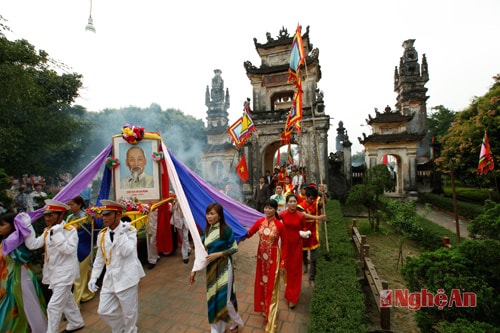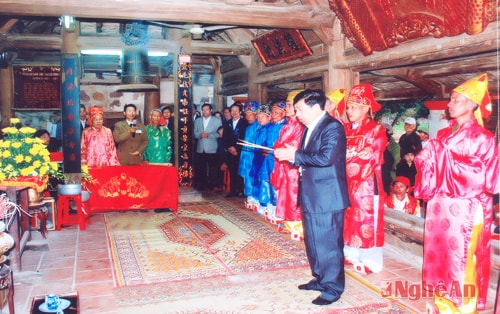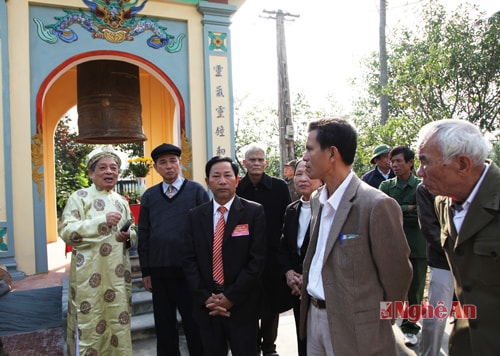Shining example of loyalty, filial piety and righteousness from the noble testament
(Baonghean) - Among the great meritorious subjects under the Vietnamese feudal regime in general and the early Le dynasty in particular, Grand Tutor Cuong Quoc Cong Nguyen Xi is the first meritorious subject identified by Vietnam Television as the person who founded the country twice.in the program Vietnamese Celebrities.
The first time was as a great general of the Lam Son uprising from the beginning to the day of complete victory to regain the country from the Ming invaders. The second time was as the leader of the counter-coup, destroying the rebels Phan Ban and Pham Don, deposing Le Nghi Dan, bringing Le Tu Thanh to the throne as King Le Thanh Tong, reigning for 38 years, bringing the country to prosperity on par with the prosperous countries in the region at that time.
 |
| Procession in Nguyen Xi Temple Festival |
| King Le Thanh Tong's epitaph:“Consider (Nguyen Xi) here: His demeanor is dignified and heroic, his character is upright. He helped Cao Hoang when he founded the country, through hundreds of difficult battles. He assisted his predecessor when he defended the city, wholeheartedly helping the enemy. He entered and exited all positions of civil and military general. Before and after, he kept his loyalty as a subject and son. He kept himself moral, innocent as jade, never showing off. He had a serious face at court, majestic as a newly drawn sword. All the officials admired his demeanor. All the four seas looked up to his prestige...” |
With such illustrious achievements, Grand Tutor Cuong Quoc Cong was placed in the highest positions and titles under the four early Le dynasties. And from a famous person, after his death, he became a famous mandarin. He was worshiped in a temple according to the "quoc tao" (state-built) and "quoc te" (state-sacrificed) regime, and was awarded the title of Thuong Thuong Dang Ton Than. No dynasty after that did not deify him. The Nguyen Dynasty built a temple to worship Liet Dai De Vuong in Hue capital. He was worshiped along with many other illustrious mandarins of the nation's history such as To Hien Thanh, Ly Thuong Kiet, Tran Hung Dao... many places in the country have temples to worship him. History books have always honored him. In the relationship between king and subject, perhaps no one like him received a treatment that somewhat went beyond the norm like the treatment of the first wise king Le Thanh Tong with Nguyen Xi through the words of the decree, the tomb epitaph, the parallel sentences, and the assignment of a top scholar to write the stele to worship him.
 |
| Provincial leaders offer incense at Nguyen Xi Temple Festival 2011 |
The life of Grand Tutor Cuong Quoc Cong was from a boy, the son of a salt farmer, orphaned by both parents at the age of 9, to become a famous historical figure. From there, he opened a famous family lineage in Lam Hong land in the Middle Ages: 59 dukes, 179 marquises, 141 counts, 7 viscounts, 37 barons. A noble position would certainly come with great benefits.
But if it were only like that, it would not necessarily be honored to the fullest by history. Because titles and benefits are always present in all times, but it is not easy to honor them in all cases. More importantly, more decisive is to leave behind family traditions. Generations of descendants of Grand Tutor Cuong Quoc Cong have been both proud and extremely grateful to the great and revered ancestor who first left his descendants the family traditions and morals from his sacred Testament. This is truly the most precious legacy.
This year At Mui is exactly 550 years since his death (1465 - 2015), the anniversary is October 30th of the lunar calendar, reading his Last Testament makes me understand that even more. Who among us, his descendants, would not be happy, proud, thoughtful, and question ourselves when re-reading these Last Testament lines:
"... Now when you see beautiful houses, good fields, and wealth, you must think of my hardships, cutting thorns and destroying bushes. When you see the scene of singing and dancing happily, you must think of the time when I had to suffer, sleeping in the snow and sleeping on cotton. I see that in the Tang Dynasty (China), Ly Tinh was a famous general, but his two sons, Kinh and Nghiep, committed treason. You should take that as an example to avoid. In the Song Dynasty (China), Cao Ban was also a famous general, but his two sons, Xan and Vi, stepped up to the position of general. You should compare yourself to them. You children and grandchildren must carefully maintain family laws and use filial piety to establish achievements. Those are my good children and grandchildren. If on the contrary, if anyone causes a conflict, you must write a petition to the court for being unfilial. You all must remember my teachings together, and not forget them!...".
Here, the word HIẾU is not only the morality of descendants towards their ancestors but also the morality towards the royal court from the great merit to the nation of leading the people to defeat foreign invaders and regain the country. HIẾU like that is towards ancestors but also towards the Fatherland and the people. The great clan of Grand Tutor Cuong Quoc Cong Nguyen Xi has become a great noble family but is the product of the word HIẾU which is also the word TRUNG and NGHIA, combining morality with merit in a harmonious and smooth way.
 |
| Professor - People's Teacher Nguyen Dinh Chu (left) introduces the Great Bell project |
As history books clearly record, this Testament was written in 1462, three years before his death. After it was completed, it was presented to the king for approval and received the royal seal of approval. Some researchers have said that this is not only a family heritage but also a national heritage.
This is a case to understand more clearly the positive side of the feudal regime in the past that has been somewhat obscured by time. It was feudalism but it was a heroic and steadfast resistance against invaders to liberate the Fatherland. Feudalism but a virtuous feudalism, which together with the nation created a strong moral spirit for the country in the Middle Ages. Unfortunately, it has gradually become diluted over time.
Our ancestor Nguyen Xi, as mentioned, was born into a poor working-class family, and orphaned at an early age, had to leave his homeland to Thanh Hoa to become a servant for Duc Le Loi when he was still a nobleman, where could he get the conditions to study like the children of a wealthy family. Yet in the end, as a great mandarin, he left not only his descendants a Testament but also a valuable document for the country today and forever. I would like to thank the beloved Vietnamese Fatherland at that time for nurturing the "famous general and famous minister" Grand Tutor Cuong Quoc Cong Nguyen Xi: A MAN OF VIRTUES of the highest order so that his descendants can forever be proud of, admire, and follow his example.
Nguyen Dinh Chu
| RELATED NEWS |
|---|
